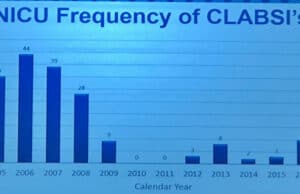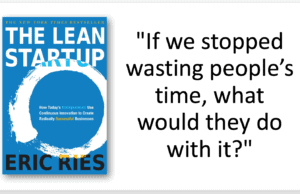Mark Graban
Should Lean Conferences Add a “Code of Conduct” for Speakers and...
In today's post, I pose a question: Should the major Lean conferences adopt or adapt a practice that's now common at tech events, including Agile and Lean Startup events: a "Code of Conduct" for participants and attendees. Is this a countermeasure to a problem that doesn't exist in the Lean community? Or, is it still good to proactively encourage people to speak up to conference organizers if they are subject to bad behavior during the event? In this post, I get feedback and thoughts from the Lean Enterprise Institute, AME, Catalysis, Lean Frontiers, and the Shingo Institute.
Change Champions at Franciscan St. Francis Health – in Supply Chain...
Today, I'd like to share the second in my series of articles about "Champions of Change." Here, we feature my friends at Franciscan St. Francis,...
The Collection of My Posts That Previewed #LeanStartupWeek
Today is the start of the main two days of 2017's Lean Startup Week event. I'm presenting tomorrow and doing the Red Bead Experiment....
What Do We Learn From Charting a Reduction in CLABSI Rates...
I'm in San Francisco for Lean Startup Week. Please say hi if you're here! Follow hashtag #LeanStartupWeek for details the rest of the week....
This Date in 1517 – The Original A3?
Exactly 500 years ago today, Martin Luther famously nailed a document to a church door that pointed out problems and ideas for change and reform.
He...
2-Data-Point Comparisons vs. Charts – NBA Big Man 3-Point Shots and...
So many of our business metrics are reported in terms of two-data point comparisons. How much did the metric change from last week? Web...
Highlights from a Great Book: “The Leader’s Handbook”
I've been going through the book by the late Peter Scholtes: The Leader's Handbook: Making Things Happen, Getting Things Done. His work builds upon the legendary W. Edwards Deming and Russell Ackoff, among others.
I often quote Scholtes (something also attributed to Peter Senge and others) as saying:
"People don't resist change, they resist being changed."
I think that's very insightful and that thought has led me to study change management, "motivational interviewing" and other related topics. It turns out that having the right answer and pushing it on others isn't the best strategy for effecting sustainable change. I had to learn those lessons the hard way and I'm still learning.
How Are “Quality Posters” Like This Still a Thing?
Back in 2007, I wrote a blog post that highlighted (if not mocked) so-called "quality posters" that are, I suppose, intended to be helpful:
https://www.leanblog.org/2007/04/krazy-kwality-posters/
Ten...
If You React to Every Blip in the Metrics, Then Nothing...
Here's another post on the theme of performance metrics, as I'm talking about next week at Lean Startup Week (see yesterday's post or others...
The Joy and the Pain of Overreacting to Metrics
As next week's Lean Startup Week approaches, I'm pretty laser focused on preparation for my:
Facilitation of the famed Deming Red Bead Experiment
My...
Podcast #291 – Jeff Roussel on the Current #Lean (and P.I.)...
My guest for Episode 291 is my friend and colleague, Jeff Roussel (@jeff_roussel on Twitter). Jeff is the VP of Sales at KaiNexus, a...
Looking for “Champions of Change” in Healthcare Supply Chains and Beyond
Who are the "champions of change" in your organization? Is your CEO a champion of change? How many of your front-line managers and staff...

















